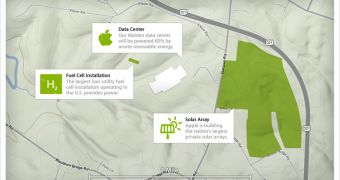Following attacks by Greenpeace activists, Apple has issued new documentation to confirm that the company’s data centers will be fully-powered by renewable energy before the end of 2012.
The company run by Tim Cook is confident that, as we prepare to pop open the champagne to celebrate the passing into 2013, our digital lives stored in the iCloud will be sustained only by installations that don’t pollute the planet.
Apple will be supplying over half of the energy needed to power iCloud through its own solutions.
“By the end of 2012, we’ll meet the energy needs of our Maiden, North Carolina, data center using entirely renewable sources,” Apple promises in a statement released on its Environment section.
“To achieve this, we’re building our own facilities that will provide over 60 percent of the clean power we need. It’s another example of Apple’s commitment to designing for energy efficiency — from the ground up.”
The Maiden, North Carolina-based data center Apple erected recently will reportedly draw roughly 20 megawatts of power at full capacity.
60 percent of this power will be produced onsite through the nation’s largest private solar arrays and non-utility fuel cell installations.
The Cupertino, California-based computer giant brags that no other company can match this scale of onsite renewable energy production.
“Onsite energy generation minimizes our dependence on the grid and reduces our environmental impact,” says the iPhone maker. “And when our solar arrays and fuel cells are operating, Apple’s Maiden data center will be the most environmentally sound data center ever built.”
Skipping the boring numbers, which Greenpeace environmentalists are sure to take another poke at, Apple concludes that it will be producing enough onsite renewable energy to power the equivalent of 10,874 homes (24 million kWh).
The fruity company isn’t stopping here. Apple wants to set an example for other technology giants in Silicon Valley, and around the world
To do so, it is registering the renewable energy generated by its solar arrays and fuel cell installations with the North Carolina Renewable Energy Tracking System (NC-RETS) established by the North Carolina Utilities Commission.

 14 DAY TRIAL //
14 DAY TRIAL //